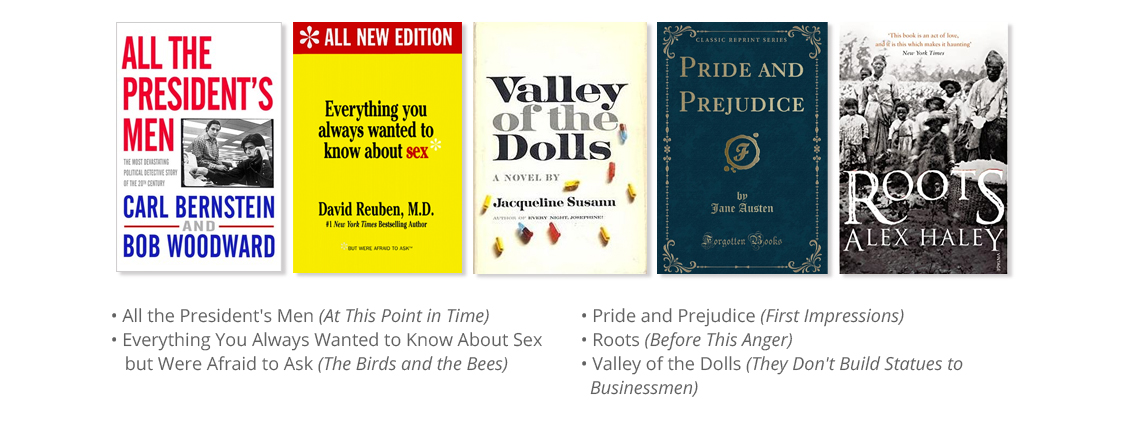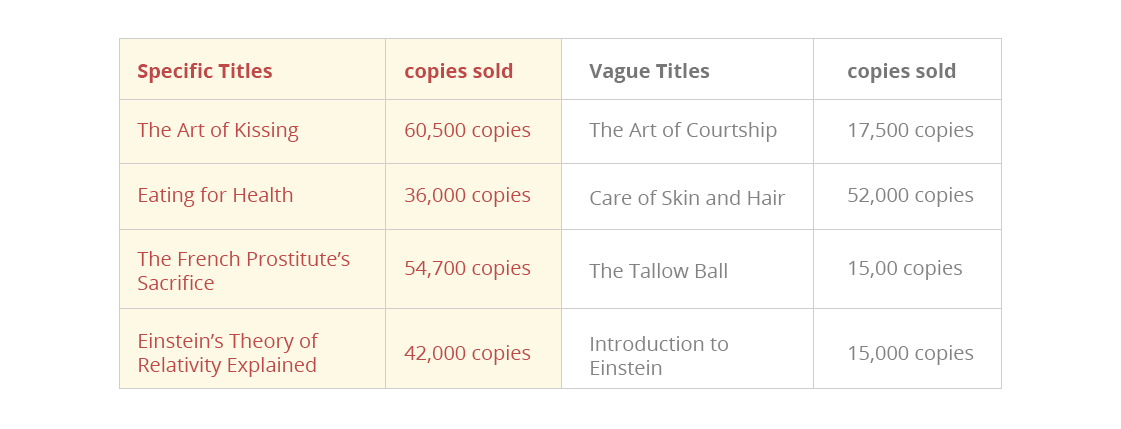Writing
How to Name Your Nonfiction Book
by Dan Poynter
Title and Subtitle selection
Selecting the title and subtitle will be the single most important piece of copywriting you will do for your book. A great title will not sell a bad book, but a poor title will hide a good book from potential customers. Both your title and subtitle must be a selling tool. They are the hook that help sales.
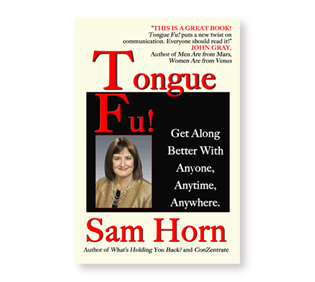
"If I had titled my book How to Defuse Conflicts or even Avoiding Verbal Combat, how many publishers (and later customers) would look at it? Tongue Fu! got me a publisher, buying readers, and later lots of media attention."
Sam Horn, author and speaker
Select a working title now so that you can improve on it as you develop your book. Start with a short, catchy, and descriptive title, and add a lengthy, explanatory subtitle.
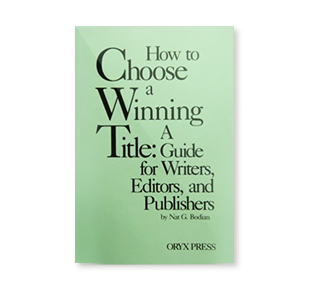
"Choose a title for your book at least as carefully as you would select a given name for your firstborn child."
Nat Bodian, author, How to Choose a Winning Title
Here are some bestsellers or classics that underwent a title change prior to publication. The original titles are in parentheses.
Comedian Mort Saul tells this story on the importance of titles: One method of bolstering sagging sales is to republish a book with a new, more provocative title and an eye-catching cover design. To illustrate, he told of a new paperback he had seen in a drugstore. On the cover was a dramatic picture of a Cossack sweeping a half-clad maiden onto his horse. In large red letters was the title: This Is My Flesh. And underneath, in small letters, was the statement, "Formerly published under the title Introduction to Accounting."
Key word
The first word of the title should be the same as the subject whenever possible to make the book easy to find. The book will be listed in Bowker's Books in Print by title, author, and subject. If the title and subject are the same, you have doubled your exposure. Most other directories list only titles in alphabetical order.
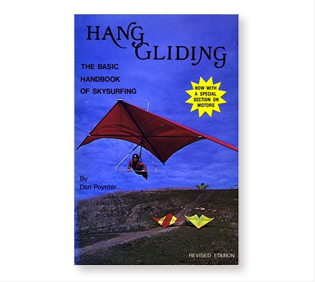
I wrote the first book on the new aviation sport of hang gliding back in 1973. I called the book Hang Gliding, the Basic Handbook of Skysurfing. The new sport was called hang gliding on the West Coast and skysurfing on the East Coast. No one knew which name would ultimately take over. I covered myself by using both key words in the title and subtitle. Years later, hang gliding won out over skysurfing and pilots were mounting motors on their gliders. I changed the title of the tenth edition to Hang Gliding, The Basic Handbook of Motorized Flight.
On the other hand, if you come up with a fantastic title and it does not begin with the key word, it is possible that you may sell so many more copies of the book due to the title that the directory listings become unimportant.
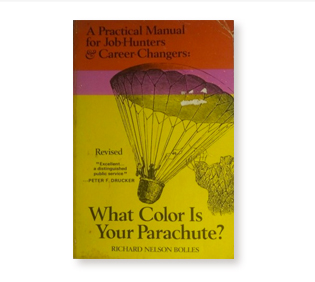
What Color is Your Parachute? is a very successful book on job finding; it is not about skydiving. Golden Parachute is a common buzzword to personnel people, but it means little to the general public.
"Every year hundreds of book authors begin their book title with Introduction to, thereby sentencing them to burial among their fellow introductions in card catalogs and reference books."
Nat Bodian, author, How to Choose a Winning Title
Most book listings do not describe the contents, so your subtitle should explain clearly what the book is about. For example, Computer Selection Guide; Choosing the Right Hardware & Software: Business-Professional-Personal is listed under the heading "computers," while the rest of the title and subtitle clearly explain what the book is about.
The title for Is There a Book Inside You? came before the book was written. Mindy Bingham came up with the title, and then she and I wrote a book around it. Based on just the title and cover art, the book club rights were sold to Writer's Digest. The text had not even been completed.
Review Books in Print, an online bookstore such as Amazon.com, a dictionary, and a thesaurus when searching for a title.
If your title is not clear, potential buyers may not find your book because it has been mis-shelved; they may be too embarrassed to ask for it, or they may not recognize it as being an important subject to them.
Make your title specific, familiar, and short
The title should be easy to remember and easy to say. The words should relate well to each other. Ollie North's book was titled Under Fire. Alan Dershowitz wrote Chutzpah. And Derek Humphrey penned Final Exit. Keep your title short and snappy. A shorter title is easier to remember.
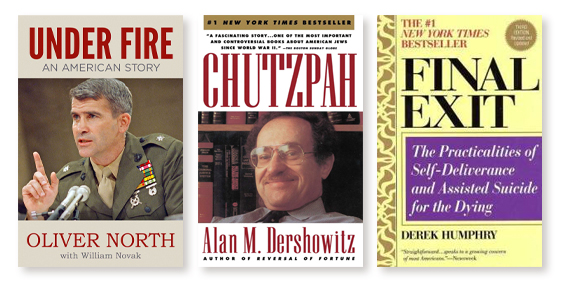
"Your title should be five words or less or people have to use their brains to repeat it."
Jeff Herman, literary agent
Books in Print uses a 92-character computer field. Make sure your title and subtitle tell the whole story and do not go over 92 characters. Some of the industry electronic ordering systems limit the title to 30 characters. Books are ordered by ISBN number and the 30-character title is just a reference.
Do not start your title with a number as in "1001 ways to..."
These titles are hard to catalog and then hard to find. Catalogers have to decide: Does the "1" go above the letters, under "one" or under "hundred"?
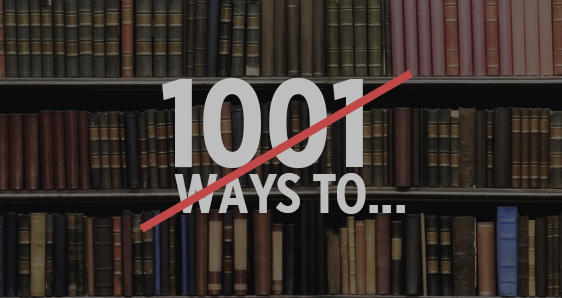
"Authors, as a rule, are poor judges of titles and often go for the cute or clever rather than the practical."
Nat Bodian, author, How to Choose a Winning Title
Image
The title should project a warm, successful, positive image. Consider, for example, a book titled We, The Lonely People. No one wants to admit he or she is lonely; no one wants to be seen reading this book on the bus. Bookstore browsers are even reluctant to be seen picking up The I Got Dumped Handbook. Think about image. Remember, Hog Island in the Caribbean wasn't drawing tourists until it was renamed Paradise Island.

The title must grab attention and make a promise. Think about other products that say Buy this hair spray and you will get a date Saturday night. Good book titles are the best teaser copy in an ad or on the shelf. Think of good teaser copy and try it for a title.
Which title would sell more books: Five Days or Five Nights? If you change just one word, the picture is completely different.
Prevention books
such as Don't Get Burned and How to Avoid Bicycle Theft are hard to sell. Try to make the title more positive. Rather than Don't Be a Victim, how about Fighting Back: Taking charge in assault, rape, and carjacking?
The title should be specific
This is the age of specialization. Today, each book and magazine is aimed at a tightly focused, highly targeted audience.
A test was made by running large ads for a book with two different titles. One was named The Art of Courtship, and the other was called The Art of Kissing. The Art of Courtship pulled 17,500 orders, while The Art of Kissing sold 60,500 because it was more specific. In another test, Eating for Health sold 36,000 copies, while Care of Skin and Hair sold 52,000 copies. And here are some more: The Tallow Ball-15,000; The French Prostitute's Sacrifice-54,700. The Art of Controversy-very few; How to Argue Logically-30,000; this title includes a promise. An Introduction to Einstein-15,000; Einstein's Theory of Relativity Explained-42,000; the new title is more specific and makes a promise.
Customers buy the specific over the general. Put your number-one benefit in the title and subtitle of your book and make the description specific.
Beware of working titles.
Working titles are dangerous because they can become too familiar while being misleading or meaningless to potential customers. Choices, a Teen Woman's Journal for Self-Awareness and Personal Planning was a hot seller, but it could not be used in schools unless there was a version for the boys. So the authors wrote a new book.
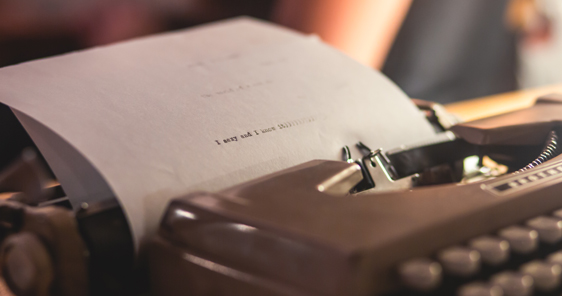
Working titles ranged from Choices II to Choices Too, and even Son of Choices. What sounded ridiculous in the beginning became familiar and sounded fairly good. Finally the three female authors settled on Changes but found that men did not like it. After discussions with a number of men, they agreed to title the book Challenges, a Teen Man's Journal for Self-Awareness and Personal Planning. Most men rise to challenges but do not like changes. Consider the potential customer.
Titles cannot be copyrighted.
The reason is there are too many books and too few words in the language. Check Books in Print and Forthcoming Books in Print for competing titles. Search an online bookstore such as Amazon.com.

"Fresh titles seem in short supply as more books are published each year. A new Harper & Row novel Continental Drift has the same name as a 1978 Knopf novel. Novels named Pearl are forthcoming from both St. Martin's and Knopf." The Wall Street Journal, February 1984
Make sure your title does not sound like the title of an existing book. Booksellers may palm off someone else's book on the customer who asks for yours.
Do not waste your efforts competing for attention with a book with the same title. Spend your time selling your book, not competing with another book.
Use generic, not proprietary names.
Some titles may be part of a trademark. For example, Checkerboard Square belongs to Ralston Purina. Avoid trademark infringement problems by steering clear of proprietary names.
A play on words may benefit from recognition.
People remember a well-turned phrase better than a dull word group. Dottie Walters wrote a book titled Speak & Grow Rich. She is playing on the famous Napoleon Hill book Think & Grow Rich. And, of course, we have seen The Joy of everything from cooking to safe sex.
Here are some more sound-alike titles: Dancing with Lawyers by Nicholas Carroll. And some relationship books by Bob Mandel: Heart Over Heals, Two Hearts Are Better Than One, and Open Heart Therapy.
What is a good title? It is one that sells the book.
Your subtitle should be descriptive.
While the title should be short, the subtitle ought to be longer and more illustrative.
"The title should be short enough to be quickly readable, but long enough to identify the book's subject, its level, and its coverage. Sometimes - particularly with books oriented toward business and management - the book's prime benefit should be part of the title as well. Most such books have compound titles separated by a colon, with the main content up front and an explanation after the colon." Nat Bodian, author
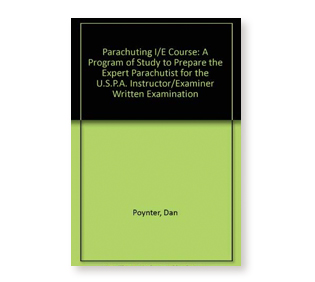
An example of a very long and descriptive title and subtitle is Parachuting I/E Course: A Program of Study to Prepare the Expert Parachutist for the USPA Instructor/Examiner Written Examination. Certainly this subtitle tells precisely what the book is about.
A subtitle may be used to distinguish one title from another. There are more than a half-dozen books titled Getting Published, but each has a unique subtitle.
Title testing.
Make up a list of possible titles and subtitles and test them on your friends. Show them a title and ask, "What is the book about?" How do they react? Do they perk up? Remember that big corporations spend lots of money testing names for new products. Record reactions. But make sure they are being objective and not just agreeing with you. Test the titles on booksellers and librarians; they know the customers, books and the business.
Visit a bookstore.
Look in that section where your title will be. Then look in other sections. Which titles catch your eye? Will your title stand out?
Your working title and subtitle will evolve as you write and your book unfolds. Writing your book is a great journey; you are on your way.
Excerpted with permission from Writing Nonfiction: Turning Thoughts into Books by Dan Poynter, © 2000.

ABOUT THE AUTHOR
Dan Poynter is a leading authority on how to write, publish, and promote books. He has authored more than 80 books (including The Self-Publishing Manual) and runs his own publishing company, Para Publishing , in Santa Barbara.
By clicking “Request My Free Consultation”, you are providing your electronic signature, voluntarily authorizing Xlibris AU and its affiliates to contact you using a manual or automated telephone dialing system and send you advertisement or telemarketing messages by email or text/SMS/MMS message to the address and phone number you have provided above. You are not required to agree to this in order to buy products or services from Xlibris AU. You certify that you are over the age of eighteen (18). You’ll get up to ten (10) messages per month. Standard message and data rates may apply. Click here to view our privacy policy.

